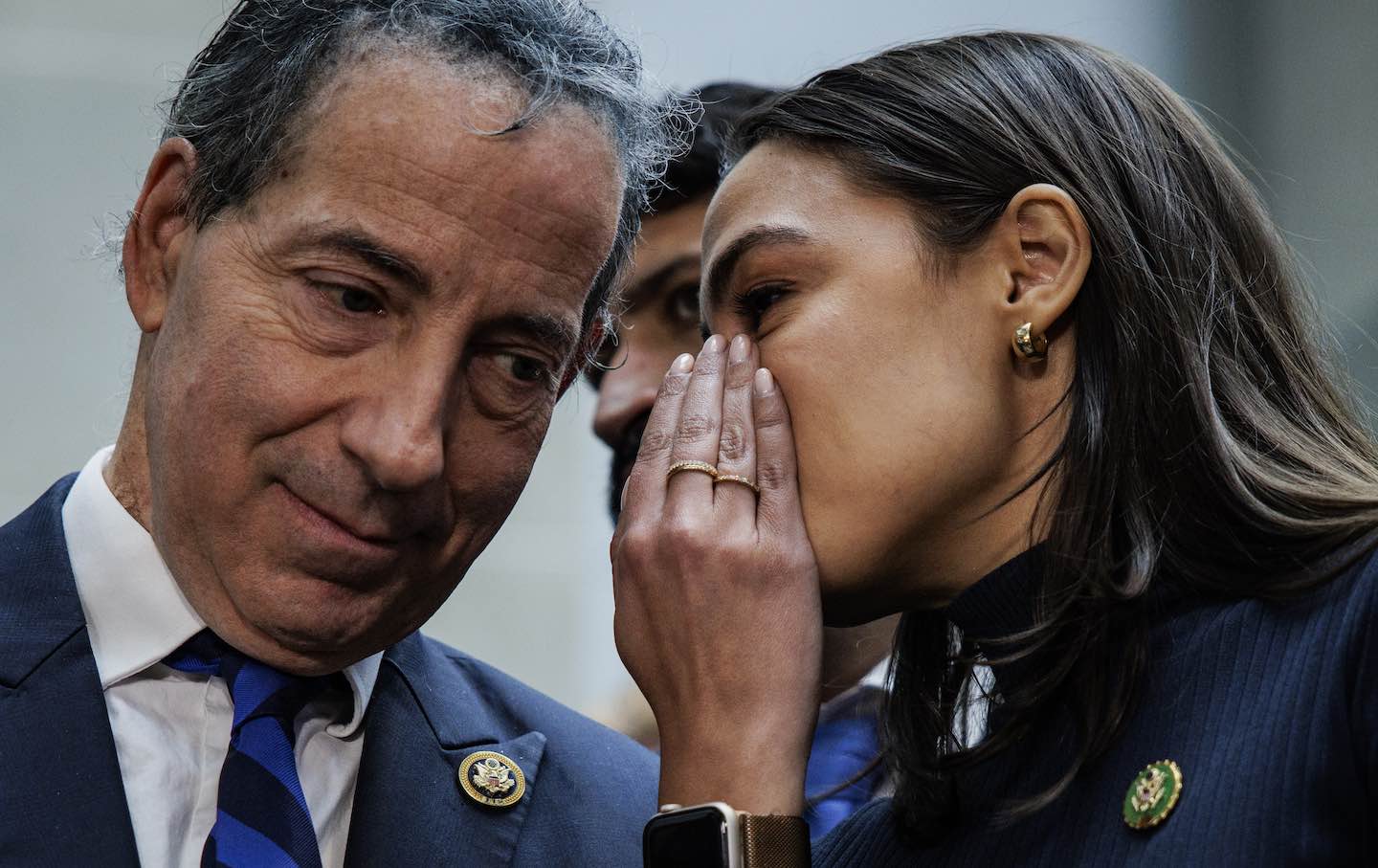Mitch McConnell Will Not Go Gently Into the Senate Goodnight
Even if the senator wanted to retire, there’s no way he’ll let Kentucky’s Democratic governor choose his replacement, even temporarily.

Senate minority leader Mitch McConnell (R-Ky.) listens to reporters’ questions during a news conference at the US Capitol on September 12, 2023.
(Chip Somodevilla / Getty Images)Senator Mitch McConnell is not well. Without going too deep into an armchair diagnosis of his recent spate of freezes and falls, it shouldn’t be controversial to say that an 81-year-old man who mysteriously stops talking and can’t start up again is likely suffering from some kind of significant health issue.
If he were a woman, the calls for him to retire would be deafening. If he were a Democrat, the calls would be coming from within his own party. If he were Joe Biden, The New York Times would run a three-part exposé on his nap times while CNN ran a “25th Amendment Tracker” keeping tabs on which cabinet officials had publicly agreed to remove him from power. But McConnell is a Republican man, which means nobody is going to pressure him into getting out of the way so somebody else can frost the glass of representative democracy.
McConnell, of course, shows no sign of being willing to retire. In private calls, he has allegedly assured Republicans that he is “fine,” and I guess everybody is supposed to take his word for it. The most simple reason for his intransigence is the pride that seems to afflict every octogenarian politician in this broken republic. For reasons I hope to live long enough to discover, old politicians seem to think they are indispensable and will continue to run for office and cling to power until the great Voter in the Sky escorts them to a farm upstate. McConnell may simply be doing what others in his generational cohort do: refuse to cede the floor to the future.
But that explanation risks treating McConnell as a normal person, and McConnell is far from normal. He is perhaps the most successful congressional operator since Henry Clay and a man who wouldn’t turn on a light switch unless it somehow helped Republicans win political power. Whether or not McConnell wants to retire is irrelevant; from his perspective, he probably can’t. That’s because his home state of Kentucky has a Democratic governor, and a law McConnell helped engineer to limit that governor’s choices on McConnell’s replacement is probably unconstitutional.
In 2019, Kentucky shocked the country by electing Andy Beshear, a Democrat, as its governor (yada, yada, all politics is local). This year, Beshear is up for reelection, and he’s running against McConnell ally Daniel Cameron, who was last seen refusing to indict the police officers who killed Breonna Taylor. Beshear leads Cameron by eight points, according to recent polling data.
Kentucky is one of 46 states that allow their governor to fill US Senate vacancies until a special election can be held and the voters can determine who will finish the senatorial term. (North Dakota, Oregon, Rhode Island, and Wisconsin are the only states that don’t allow these kinds of temporary gubernatorial appointments but instead go straight to special elections.) This means that if McConnell retires while Beshear is in office (which might be for a long time yet), Beshear gets to fill his seat temporarily.
But there’s a catch. In 2021, at the urging of McConnell, Kentucky became the 11th state to limit the governor’s choices for a replacement senator. The Kentucky law requires the governor to pick a senator from the same party as the retiring senator, and requires the governor to pick from a list of three candidates provided by the executive committee of the departing senator’s political party. The Kentucky legislature passed the law over Beshear’s veto.
If that scheme sounds odd to you, it should, because it almost certainly violates the 17th Amendment of the Constitution. The 17th Amendment, ratified in 1913, provided for the direct election of senators by popular vote. The amendment also empowers the “executive authority of the state”—which means the governor—to fill Senate vacancies, as long as the legislature gives them authority to do so before a special election is held. Before the change, senators were chosen directly by state legislatures, which meant that party bosses were able to hand out Senate appointments as if they were a patronage position.
Kentucky’s replacement law is exactly the kind of thing the 17th Amendment was meant to stop. In his veto statement, Beshear explained the constitutional problems with the law as well as I can. The governor wrote: “The Seventeenth Amendment does not authorize legislatures to direct how the Governor makes an appointment to fill vacancies, and the legislature may not impose an additional qualification on who the Governor may appoint beyond the qualifications set for a United States Senator set forth in the Constitution.”
If McConnell retires, the most likely thing for Beshear to do would be to appoint whomever he wants, let the Kentucky legislature sue him, and take the case to the Supreme Court. Despite Republican control of the court, I think Kentucky’s law is likely to lose. Even conservative legal commentators have noted the potential constitutional weakness of the Kentucky replacement scheme.
Still, even if Kentucky’s legislature manages to overcome the 17th Amendment, there is yet another wrinkle: Who is going to tell Beshear’s replacement senator to go home? Remember, as of now, Democrats still control the Senate. Beshear would name a replacement; that replacement would present his credentials to the Democratic-controlled Senate; and that’s just about all it takes to make a new incumbent a senator. By the time the appeals made it to the Supreme Court, Kentucky would be at or near the special election anyway.
McConnell, of all people, understands how raw political power works, and he surely understands that Democrats have it right now, regardless of Kentucky’s constitutionally questionable law. Even if McConnell’s Senate seat flips to a Democrat for only a few months, those are a few months during which the Democratic majority would be freed from the clutches of Joe Manchin and Kyrsten Sinema. A motivated party could push through a lot of federal judges in a few months.
Popular
“swipe left below to view more authors”Swipe →Whether McConnell retires “gracefully” or orders his staff to Weekend at Bernie’s him until 2026 probably depends on whether Beshear wins reelection in Kentucky. McConnell may be unwell, but I doubt he’s forgotten “how to do politics.” Ironically, McConnell’s entire accursed career has probably done the most work to create the Senate conditions that require him to hang on until the bitter end. The Senate that McConnell created is one devoid of grace: It’s now just a raw exercise in obstruction, where even human frailty is exploited for partisan gain. Somewhere, I bet Ted Kennedy (whose death McConnell exploited to deny the inclusion of a public option in the Affordable Care Act) is watching McConnell’s travails with great interest.
McConnell’s legacy is partisanship, whatever the costs. That seething commitment to do only what is in the best interests of the Republican Party means that right now, McConnell is locked into his role as another Republican vote, at the cost of his dignity and health.
More from The Nation

Democrats Are Overdue for New Leadership Democrats Are Overdue for New Leadership
To mount an opposition under the coming Trump administration, the party needs new ideas—not the same establishment clinging to power.

Why Democrats Are Losing Americans Without a College Degree—and How to Win Them Back Why Democrats Are Losing Americans Without a College Degree—and How to Win Them Back
Voters intuitively understand that the economy has not worked well for most of us for decades. Democrats must offer them a big transformative vision, and stick to it for as long a...

The “Save Chinatown” Coalition Goes on the Defensive in Philadelphia The “Save Chinatown” Coalition Goes on the Defensive in Philadelphia
The construction of a new basketball arena threatens to fill the neighborhood with more traffic and raise rents.

The Peculiar Case of Ignatius Donnelly The Peculiar Case of Ignatius Donnelly
The Minnesota politician presents a riddle for historians. He was a beloved populist but also a crackpot conspiracist. Were his politics tainted by his strange beliefs?

My Dystopian Novel Predicted Trump 2.0 My Dystopian Novel Predicted Trump 2.0
SOLIS was meant to serve as a warning of what could come. With Trump’s reelection, it should serve as a blueprint for the bravery and activism needed to fight back.



